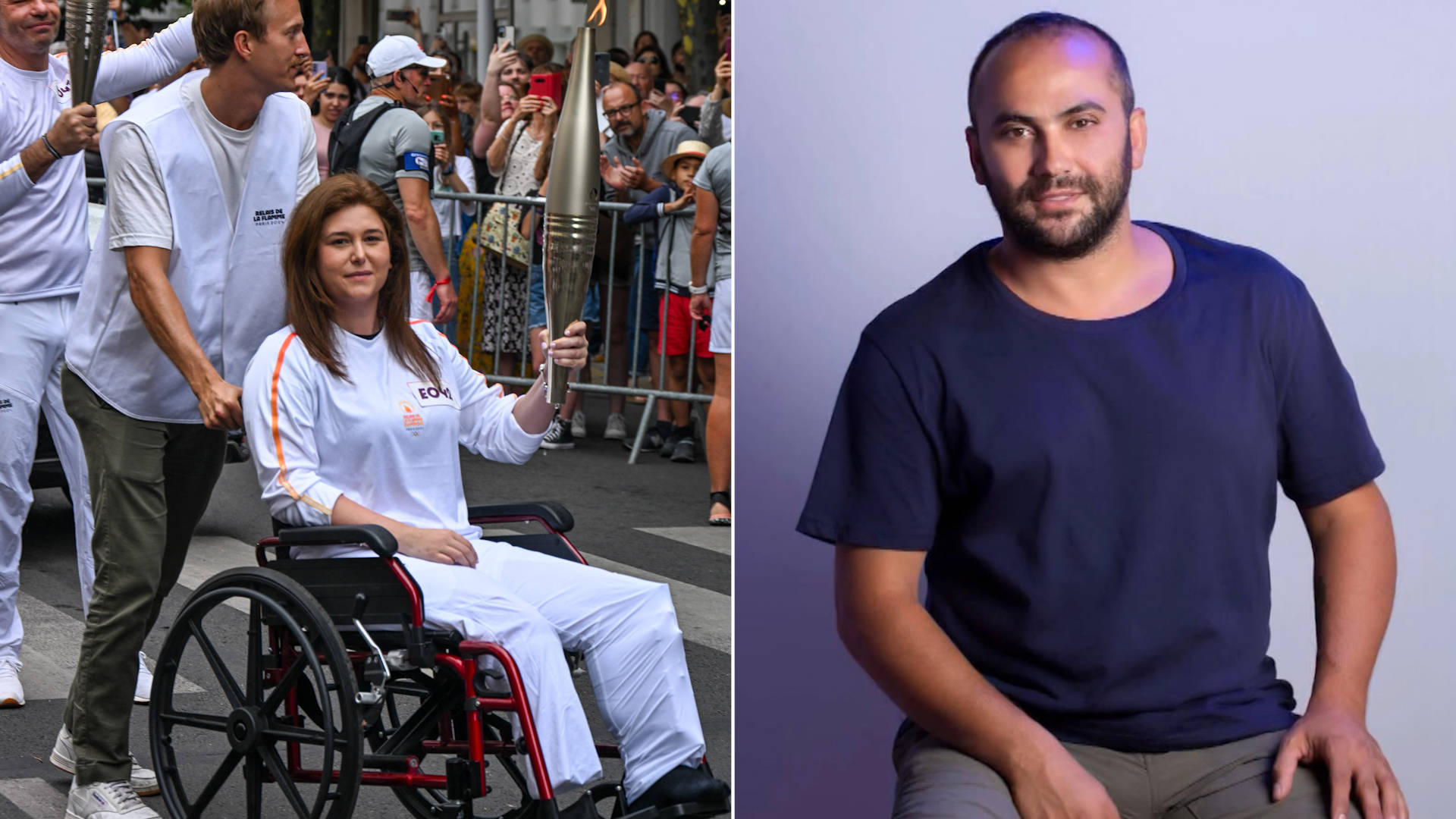This is a rush transcript. Copy may not be in its final form.
AMY GOODMAN: This is Democracy Now!, democracynow.org, “War, Peace and the Presidency.” I’m Amy Goodman.
The opening ceremony for the Summer Olympics is happening today in Paris. We begin our coverage with Lebanese photojournalist Christina Assi of Agence France-Presse. She carried the Olympic torch in Paris Sunday to honor journalists wounded or killed on the job. She lost her leg in the same Israeli attack on southern Lebanon that killed Reuters videographer Issam Abdallah. Christina Assi spoke Sunday.
CHRISTINA ASSI: Of course, this is all for my best friend, Issam Abdallah, and all the other journalists who we have lost this year. This is all for them and to pay tribute and to honor them, to honor their memory. And I will keep Issam’s memory alive in everything I do. It’s all for him.
AMY GOODMAN: It was October 13th last year when an Israeli tank strike killed Reuters journalist Issam Abdallah while he was reporting in southern Lebanon with six other journalists. A video produced by Amnesty International shows how human rights investigators determined Abdallah was killed by an Israeli tank shell.
MARIJA RISTIC: In many cases when we work on conflicts, the weapon can directly lead us to perpetrators. This is the key piece of evidence. My colleague, who’s our weapons analyst, knew immediately what this weapon is.
AYA MAJZOUB: It was a 120-millimeter tank round. And that confirmed that it was the Israeli military that fired on the journalists, because Hezbollah and the armed groups in south Lebanon don’t use those kinds of weapons.
MARIJA RISTIC: And more importantly, we did identify this weapon before being used by the Israeli forces in the context of different strikes on Gaza. So this is at least the third time where we are able to link this type of weapon with the Israeli forces.
AMY GOODMAN: For more, we’re joined, now back in Beirut, Lebanon, by Christina Assi, one of the journalists who survived this attack. She had to have her leg amputated. She carried the Olympic torch in Paris Sunday to honor journalists wounded or killed on the job. The Committee to Protect Journalists reports, since October 7th, at least 108 journalists have been killed, the majority Palestinian, targeted by Israeli strikes on the Gaza Strip.
Christina Assi, welcome to Democracy Now! I’m so sorry about what happened to you and also, in your case, the Lebanese photojournalist Issam Abdallah. We did a story on him after he was killed. Can you describe what happened on October 13th? He had just set up the video in your position in southern Lebanon, so that people around the world, particularly journalists observing this video, saw when you were all attacked.
CHRISTINA ASSI: Thank you for having me.
On October 13, we were doing our job. We were a group of journalists from different agencies and channels. We heard there is a bombardment in a village nearby, so we all moved there. And we chose an exposed area, specifically just so we don’t look suspicious. And there was a drone monitoring us the entire time.
So, we were there for around 50 minutes, 40 to 50 minutes. And then, out of nowhere, we were attacked the first time. And I immediately fell to the floor, to the ground. And I couldn’t feel my legs, so I started screaming to my colleague, Dylan Collins, to help me. But, unfortunately, a few seconds later, we were attacked again, and everyone disappeared. There was a car burning next to me, and I was afraid to burn to death. So I had to do something, and I started moving away from it by crawling. It was a horrific experience. I had no idea that we lost Issam Abdallah on the spot. I found out later on after I woke up in the hospital.
AMY GOODMAN: And so, can you talk about now, what you did on Sunday, and how it was that — I mean, is this a first? — that the Olympics honored journalists wounded or dead, like you, wounded, like Issam, killed? What was your experience like in Paris carrying the torch?
CHRISTINA ASSI: It was a great opportunity to shed light on what happened with us and draw attention to the urgent need to protect journalists, especially journalists who still choose to report despite all the mental and physical toll. We just wanted to send this message to the world, so they can hear us and know our story and know about the atrocities that have been happening in this region.
AMY GOODMAN: And after you were struck by this Israeli tank missile, and Issam killed, talk about how you made it to a hospital and your long road to recovery, and, finally, what Israel has said to you. Have they accepted responsibility?
CHRISTINA ASSI: I was in an induced coma for 12 days. So, after I woke up, I just found out that my entire life changed. And I had to stay in the hospital for five months. It’s been nine months, and I’m still doing surgeries. I still can’t walk. And I still need around a year to be able to stand and walk again and do my duty and my mission.
Regarding Israel, no, they did not take responsibility. They apologized and said that this is a war zone, and it’s a mistake, and they don’t take responsibility for what happened. However, all investigations and the military experts proved that it was a targeted attack. We were targeted twice, and then there was a machine gun, as well. So, I’m not sure how it could have been a mistake.
AMY GOODMAN: And what about Agence France-Presse, AFP, your French news agency that you work for? What have they demanded?
CHRISTINA ASSI: I mean, there is an investigation going on, and they’ve been collaborating with Amnesty, human rights and all the other organizations that are trying to get us justice. However, we all know that when it comes to Israel, justice is far-fetched. So, I hope all this effort, the collective effort that they’ve been working on, will actually reach something.
AMY GOODMAN: And let me ask you — in March, the U.N. investigation accused Israel of breaking international law over the killing of Issam Abdallah of Reuters. And you have his family, just this past week, filing — setting out the basis upon which there are strong grounds to conclude that Issam’s killing constitutes a war crime and raises grave concerns regarding evidence of a long-running practice of the targeting of journalists.
CHRISTINA ASSI: Yes, the family of Issam Abdallah have been also working to get justice for his killing. It is a war crime. Everything proves — like, again, all the investigations, the collective investigations that have been done by different organizations, prove that it was a targeted attack, and, as a result, it’s a war crime, because under international law and the Geneva Convention, journalists must be protected.
And that’s why we wear our vest “press.” That’s why we take all the precautions and the measurements and we take — like, we wear our helmets. We added on our cars that it’s TV. So, there was all the indications that we are press and we were just doing our job. We weren’t holding guns; we were holding cameras.
And that’s a huge issue, because after our attack, we also lost three other colleagues from a different TV channel because they were also attacked, and then another attack. They were just trying to scare the journalists. And as a result, that’s why journalists are not going anymore to the southern border of Lebanon.
AMY GOODMAN: Finally, Christina Assi, as you bring attention to what took place, carrying the torch in Paris — we’re going to go to Paris in a minute to cover what’s happening there as the Summer Olympics begins today. Do you plan to continue as a war photojournalist, so dominated by men? You yourself have lost your leg. What motivates you to do this work?
CHRISTINA ASSI: I mean, I feel like everything has been taken from me, taken away from me, my entire life, my mobility even, because, like, it’s been nine months I haven’t been working. I think when someone goes through something as horrific and horrendous, and, like, when you fight every day to survive mentally and physically, there is nothing can stop you anymore. Of course I won’t let them to silence me. Of course I want to go back and do my duty and mission. However, given that journalists have a mission to document what’s happening, it’s also — we do not accept the global culture of impunity. Something needs to happen. We need actions. We don’t need words anymore. Journalists and civilians have to be protected.
AMY GOODMAN: Christina Assi, we thank you so much for being with us and for your bravery, Lebanese photojournalist with Agence France-Presse, lost her leg in the same Israeli attack in October that killed the Reuters videographer Issam Abdallah. Christina carried the Olympic torch in Paris Sunday to honor journalists wounded or killed on the job.
Next up, we go to Paris, where the opening ceremony takes place today for the Summer Olympics. We’ll look at greenwashing and displacement of vulnerable communities ahead of the games. Stay with us.
[break]
AMY GOODMAN: “Wavin’ Flag” by the Somali Canadian musician K’naan, singing in our Democracy Now! studios back in 2009, before it became the anthem of the World Cup. He has just won a Grammy for his song “Refugee.”











Post comments (0)